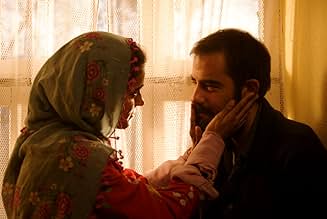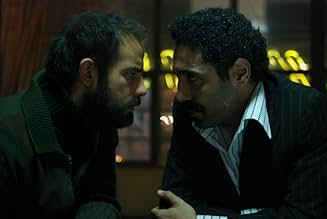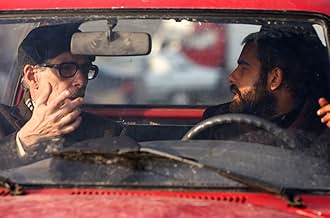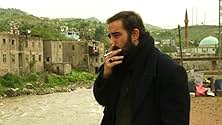IMDb-BEWERTUNG
6,9/10
1257
IHRE BEWERTUNG
Füge eine Handlung in deiner Sprache hinzuA Turkish small time black marketeer wants to enter the cell phone business. To get enough money, he promises the local doctor to get medicine for sick children.A Turkish small time black marketeer wants to enter the cell phone business. To get enough money, he promises the local doctor to get medicine for sick children.A Turkish small time black marketeer wants to enter the cell phone business. To get enough money, he promises the local doctor to get medicine for sick children.
- Auszeichnungen
- 6 Gewinne & 4 Nominierungen insgesamt
Handlung
Ausgewählte Rezension
Turkish film The Market: A Tale of Trade is about a poor but eager middle-aged businessman supporting a family in early 1990s Turkey, under relatively low-key living conditions, whom is explored to subscribe to a more Capitalist ideal only to become more desperate and less law abiding as the film wears on. The man is Mihram (Ayaydin), someone whom comes across as a slave driver of sorts in his driving employees on in a local black market business that he runs and someone whom both berates laziness and seems immensely shrewd in his line of work. The man has aspirations to escalate and move on up into the cell phone industry, something a close companion informs both him and us of the dangers and sheer risk of going anywhere near; but a self-promotion is what he wants and his lust to subscribe to a Capitalist ideal in escalating and moving up a rung into a richer sector for himself and his family is what he wants. The film coming to resemble a fascinating, deeply involving drama about the man having to raise the money to get this dream going; the lengths he has to go and how it affects not only his well-being but those around him.
The film is a satisfying blending of gritty realism with black comedy with certain escapist, absurdest elements. It isn't everyday you encounter a film that contains a Bollywood-style musical number describing how the Islamic world is now rife with Western infused ideologies, complete with musicians unbeknownst to the characters but directly addressing us, as well as a tense and unnerving encounter at a border checkpoint as Kalachnikov wielding guards sniff over a truck whose driver is trying to smuggle items across. Director Ben Hopkins, whom through his name doesn't strike me as being particularly Turkish, balances all the elements and content perfectly; demonstrating expertly an ability to portray life in a foreign nation, under a foreign culture at a set time some fifteen-odd years ago. Hopkins has an eye for catching the hardships and lifestyles the majority of his characters lead, and how they affect them. The urgency applied to the film, given what's at stake, and what it is that is to be undertaken means to his characters displays an acute sense of awareness on Hopkins' behalf of a specific country and its specific people going through very specific changes at a specific time – in short, it's nigh on masterfully directed.
The lead is indeed Mihram, a conversation with fellow business accomplice Mustafa (Sahin) in a dingy little outdoor corridor set away from the main street the film's point of no return as he undertakes this business mission. Behind the lead, metal shutters appear cold and shut off what is behind him so we cannot see; the sense that they resemble a closed shop front or a previous establishment which has since gone out of business and been shut down at the front, gently resonating with us as what is spoken about plays out. Leading off into the distance and into brilliant white daylight, manipulated so as to catch our eye at the end of this tunnel, is a path into the unknown; a road down which it itself is dark and dingy but offers a fleeting glance at salvation in the process. The placing of the two characters here and having them speak of what they speak about foreshadow's Mihram's passage or journey ahead which could very well end in either disaster or a considerably better-off existence, as exemplified by the looming shutters thrust down upon a local business or the high life representative by the bright light.
Hopkins' setting of the film in a dusty; warm; humid period of summer in 1994 Turkey allows ideas linked to the downfall of Communism in Eastern Europe of around the time to play out more effectively and in a fresher manner: Mihram is most probably one of the first to unleash himself upon this newfound opportunity of more global supply and demand. The explosion of a newfound sense of identity or of 'self' within the depths of Eastern Europe at around this time appear to enable people, such as the man we follow in Mihram, to partake in a more generalised; more Western way of living born out of the collapse of former ways of life. Indeed, in one sequence on an isolated and somewhat barren rural hillside, an elderly woman berates cell phone company employees for overseeing maintenance on a large pylon in her vicinity; the pylon of which is more broadly linked to Mihram's overall Capitalist goal in that he chases a cell phone enterprise and one of which is intrinsically linked to an elderly, more traditional person's disregard for both the fresher mindset and the globalised ideas that arrive with these ideas.
The central point of interest is what gallivanting off on this trek does to our lead; The Market: A Tale of Trade effectively an hour of a man put through a wringer of Western approaches to business and the cold hearted; calculated; criminally minded characteristics it either brings out in him or, given whatever early perception you have of the man, accentuates. One particularly distressing scene unfolds in a hospital, the walking through a child's ward so as to get to somewhere in which the stealing of some medicine is possible - an allowing of the lead to observe whom it is he is effectively taking from so as to hopefully garner an advance in his own life. Was Mihram, this home owning family man whom has a youngster of his own, always this kind of person? Or have fresh ideologies implemented on both his nation, and those republics around Turkey, veered everybody off and away from the equal distributing Communist mindset into greed and individualism. The blackly comic humour abound in his bumbling attempts to do what he is trying are blended in majestically, the film a thoroughly nourishing slice of cinema.
The film is a satisfying blending of gritty realism with black comedy with certain escapist, absurdest elements. It isn't everyday you encounter a film that contains a Bollywood-style musical number describing how the Islamic world is now rife with Western infused ideologies, complete with musicians unbeknownst to the characters but directly addressing us, as well as a tense and unnerving encounter at a border checkpoint as Kalachnikov wielding guards sniff over a truck whose driver is trying to smuggle items across. Director Ben Hopkins, whom through his name doesn't strike me as being particularly Turkish, balances all the elements and content perfectly; demonstrating expertly an ability to portray life in a foreign nation, under a foreign culture at a set time some fifteen-odd years ago. Hopkins has an eye for catching the hardships and lifestyles the majority of his characters lead, and how they affect them. The urgency applied to the film, given what's at stake, and what it is that is to be undertaken means to his characters displays an acute sense of awareness on Hopkins' behalf of a specific country and its specific people going through very specific changes at a specific time – in short, it's nigh on masterfully directed.
The lead is indeed Mihram, a conversation with fellow business accomplice Mustafa (Sahin) in a dingy little outdoor corridor set away from the main street the film's point of no return as he undertakes this business mission. Behind the lead, metal shutters appear cold and shut off what is behind him so we cannot see; the sense that they resemble a closed shop front or a previous establishment which has since gone out of business and been shut down at the front, gently resonating with us as what is spoken about plays out. Leading off into the distance and into brilliant white daylight, manipulated so as to catch our eye at the end of this tunnel, is a path into the unknown; a road down which it itself is dark and dingy but offers a fleeting glance at salvation in the process. The placing of the two characters here and having them speak of what they speak about foreshadow's Mihram's passage or journey ahead which could very well end in either disaster or a considerably better-off existence, as exemplified by the looming shutters thrust down upon a local business or the high life representative by the bright light.
Hopkins' setting of the film in a dusty; warm; humid period of summer in 1994 Turkey allows ideas linked to the downfall of Communism in Eastern Europe of around the time to play out more effectively and in a fresher manner: Mihram is most probably one of the first to unleash himself upon this newfound opportunity of more global supply and demand. The explosion of a newfound sense of identity or of 'self' within the depths of Eastern Europe at around this time appear to enable people, such as the man we follow in Mihram, to partake in a more generalised; more Western way of living born out of the collapse of former ways of life. Indeed, in one sequence on an isolated and somewhat barren rural hillside, an elderly woman berates cell phone company employees for overseeing maintenance on a large pylon in her vicinity; the pylon of which is more broadly linked to Mihram's overall Capitalist goal in that he chases a cell phone enterprise and one of which is intrinsically linked to an elderly, more traditional person's disregard for both the fresher mindset and the globalised ideas that arrive with these ideas.
The central point of interest is what gallivanting off on this trek does to our lead; The Market: A Tale of Trade effectively an hour of a man put through a wringer of Western approaches to business and the cold hearted; calculated; criminally minded characteristics it either brings out in him or, given whatever early perception you have of the man, accentuates. One particularly distressing scene unfolds in a hospital, the walking through a child's ward so as to get to somewhere in which the stealing of some medicine is possible - an allowing of the lead to observe whom it is he is effectively taking from so as to hopefully garner an advance in his own life. Was Mihram, this home owning family man whom has a youngster of his own, always this kind of person? Or have fresh ideologies implemented on both his nation, and those republics around Turkey, veered everybody off and away from the equal distributing Communist mindset into greed and individualism. The blackly comic humour abound in his bumbling attempts to do what he is trying are blended in majestically, the film a thoroughly nourishing slice of cinema.
- johnnyboyz
- 15. Nov. 2010
- Permalink
Top-Auswahl
Melde dich zum Bewerten an und greife auf die Watchlist für personalisierte Empfehlungen zu.
- How long is The Market: A Tale of Trade?Powered by Alexa
Details
- Erscheinungsdatum
- Herkunftsländer
- Offizieller Standort
- Sprachen
- Auch bekannt als
- The Market: A Tale of Trade
- Produktionsfirmen
- Weitere beteiligte Unternehmen bei IMDbPro anzeigen
Box Office
- Budget
- 1.200.000 € (geschätzt)
- Weltweiter Bruttoertrag
- 100.076 $
- Laufzeit1 Stunde 33 Minuten
- Seitenverhältnis
- 1.85 : 1
Zu dieser Seite beitragen
Bearbeitung vorschlagen oder fehlenden Inhalt hinzufügen

Oberste Lücke
By what name was Pazar - Der Markt (2008) officially released in Canada in English?
Antwort
























